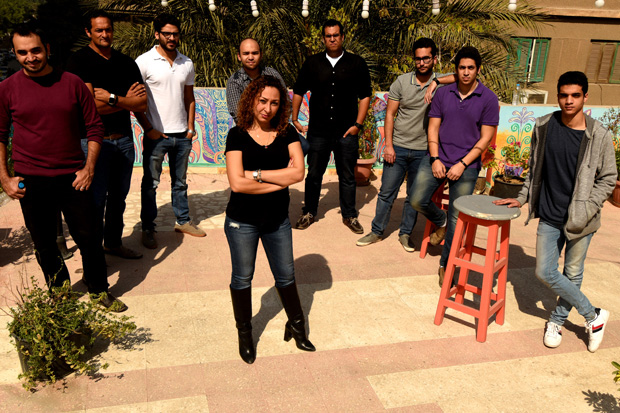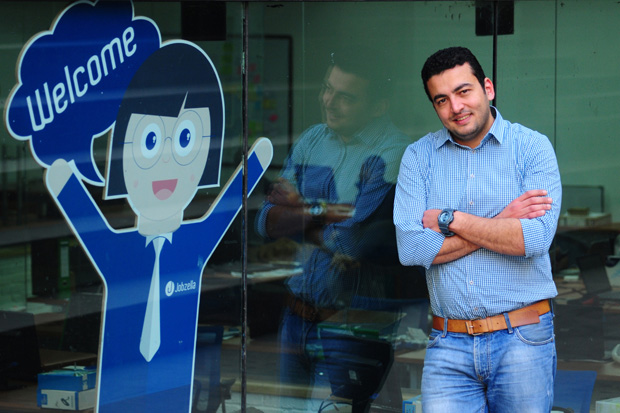From an errand service, to a website cataloging menus to a professional network, we get three first-hand success stories as told by the startups who have overcome obstacles and made it happen.
by Farah El Akkad
Elmenus.com
After working for a number of companies as a team consultant, Amir Allam, founder of elmenus.com, was bored with working in a traditional 9 to 5 job and decided to start up his own business. “After being fed up of taking risks and eating at restaurants that turn out below expectations and since I always liked to know the menu of any restaurant before actually going to it, I thought of elmenus.com. At the time there weren’t any online or offline platforms that allowed people to look up menus, addresses or telephone numbers of restaurants and photos of the place,” Allam recalls. Elmenus.com allows people to look up food according to their preferences; type of food, location and prices. Allam started his project by picking up restaurant menus from the streets and establishing a website, depending on his own financial resources. “With the help of web developers, in less than three months the website had more than 20,000 viewers.”
Unlike many startups who approach others for funding, Allam took a different road, depending only on generating money from ads. “We did not get any revenues for many months but we started making money from ads during the first year, which is considered very successful,” Allam says proudly.
Today, elmenus.com has more than half a million viewers per month. Allam explains that up till now the team depends only on revenues coming from ads. “Of course, we had some offers from investors but mainly from family and friends,” says Allam who says elmenus.com’s key to success “is that we respect users and tell them the truth. Because in the end we are these users. We are trying to make something for ourselves too.”
Elmenus are currently looking to expand into other countries and are expected to launch a new version of their website that focuses more on social media features. Allam believes the most important aspect of success is doing something you love and gathering a team who are equally excited about it. “Even if you do not have the needed support, it does not matter as long as you love it because it is not easy at all. You must have the passion and you must be patient and willing to sacrifice and not just someone who wants to run away from your job because you’re bored,” Allam advises.
Elves, Your Personal Little Helper
[caption id="attachment_485359" align="alignnone" width="620"] “We are trying to make it easier for people to get things done,” says co-founder Abeer El Sisi.[/caption]
“We are trying to make it easier for people to get things done,” says co-founder Abeer El Sisi.[/caption]
In Egypt there are a lot of things you cannot order online and people are always busy; Elves is “a little helper in your pocket,” as the team calls it. “We are trying to make it easier for people to get things done. Instead of wasting time in traffic and long queues, Elves is like a personal assistant,” says co-founder Abeer El Sisi. “Be it someone wanting a specific kind of tree for his new villa and cannot find the right one, or someone needing to deliver a gift to someone at a particular time in another country — Elves can do anything,” El Sisi explains.
El Sisi and her husband Karim El Sahy have long been interested in entrepreneurship and started a number of projects in the U.S. They met with other team members Abdel-Rahman El Zohairy, Khaled Gomaa and Kareem Diaa in different startup events in Dublin and Cairo. “We frequently met to brainstorm for ideas and at this one time we were sitting watching a movie and I was like, ‘I wish we had popcorn. If only I could just text someone who can bring me popcorn right now,’ and that is where it came from,” El Sisi recalls.
“The whole idea started from our needs, for instance sometimes we want to order food but we were too lazy to do; El Sahy wanted to get a present for Abeer’s dad who lives in Dubai and did not know what to pick or how to deliver it,” adds Gomaa. “When you think about it on a larger scale, we always need someone to help. So why not do it? A convenience platform and we were actually the first users of it.”
Jobzella
[caption id="attachment_485358" align="alignnone" width="620"] “Companies and investors do not invest in an idea. They invest more in the team who is working on it,” says Jobzella co-founder Nader Batrawy.[/caption]
“Companies and investors do not invest in an idea. They invest more in the team who is working on it,” says Jobzella co-founder Nader Batrawy.[/caption]
The idea of establishing a successful startup is not about having a good idea. It is about bringing it into action,” says Nader Batrawy, co-founder and CEO of Jobzella. “Companies and investors do not invest in an idea. They invest more in the team who is working on it.”
Jobzella is the first professional network and job aggregator in the Middle East that gathers professionals, qualified talents and candidates, offering online courses from all around the world in one place. When Batrawy first thought of Jobzella, the most important aspect he had in mind was forming a good team because as he explains “this is what matters if you want to put a business model into action, an idea that will be successful in the future. I used to work in a company in a related field so I introduced the idea of Jobzella to my manager and technology manager. They both found the idea very appealing and agreed to join as co-founders,” recalls Batrawy. As an expert in the field of business development, legal and admin work, Batrawy focused on the Egyptian market while another co-founder, who was an expert in the Gulf market, focused on that. Based in Egypt, Jobzella’s team did not seek an incubator or seed funding but depended mainly on self-funding to sustain the business for eight months before its official launch. “We wanted to produce a high-quality website. We agreed that we will not talk to any investors before officially launching the website because we wanted to show that we had a successful business model,” Batrawy says.
The Jobzella team started presenting their project to a number of companies in which they had previously worked, which highlights the importance of networking in helping any startup succeed. “We agreed to concentrate our entire marketing budget on getting traffic for these companies on our website and they started putting their pages and were active,” Batrawy says, adding that he does not believe reaching out to an incubator to support your project is a good thing. “It is not a large sum of money and at the end it usually does not cover expenses and you end up waiting for an investor. I thought that if I want the idea bad enough, I have to sacrifice for it and give it my all so I sold some of my assets such as my house and car and depended fully on myself and the rest of the team did the same until we were able to launch and present investors with a respectable, successful business model.”
After a pilot launch in August 2013, Jobzella were granted their first round of investment, which was a small amount of money. “After another six months we talked to more investors but it was very hard, most people did not like the idea of online recruitment because it is not a mass market product. We were only targeting specific people; our’s was a business that is very slow and takes a really long time to be profitable,” Batrawy explains.
Jobzella’s team decided to open a new market for their project and to avoid the technology market. “We switched our target to companies related to other markets, one of which is Al Khaleej Training and Education, the largest education and learning network in the Middle East. We met with them and convinced them that instead of only focusing on training employers, why not offer them talent acquisition and recruitment as well. They liked the idea and the team and they invested with us,” Batrawy says.
At the end of the day he explains that it all depends on the idea and the type of project. Not all startups need a large sum of money. “Some very successful projects started in one office using only one computer.”
Comments
Leave a Comment